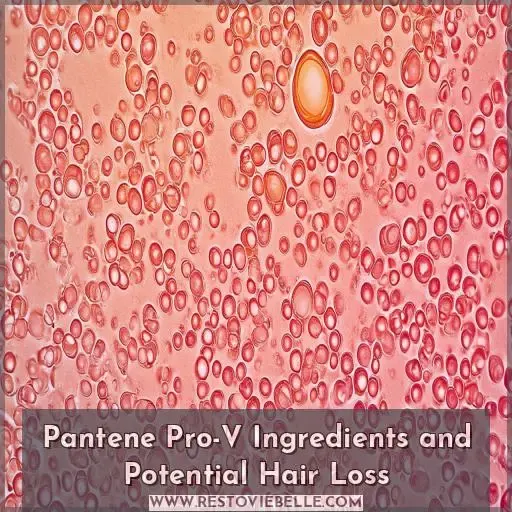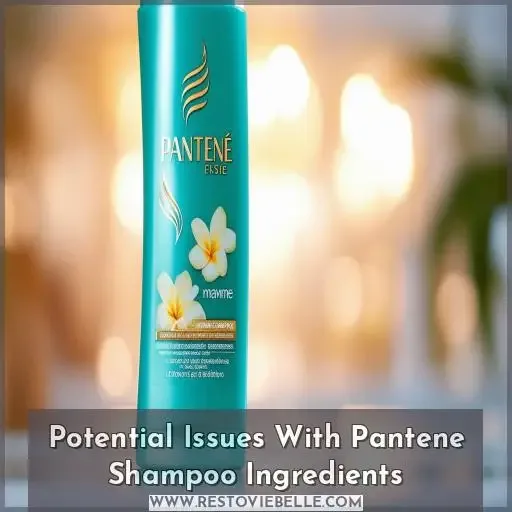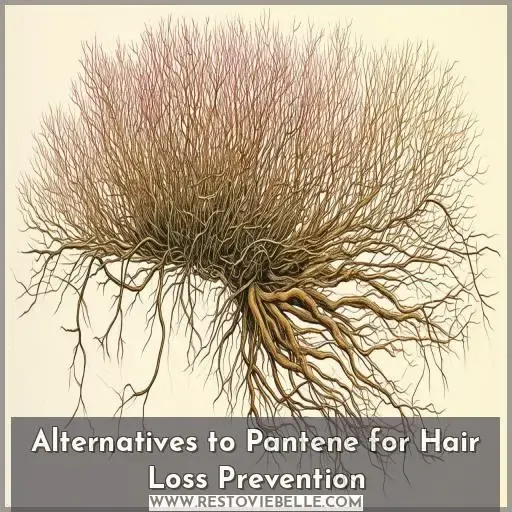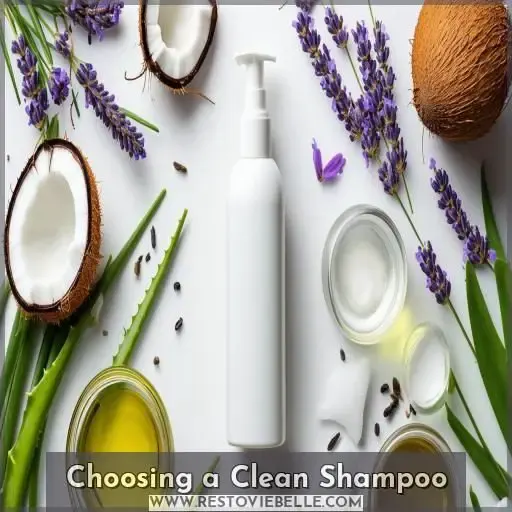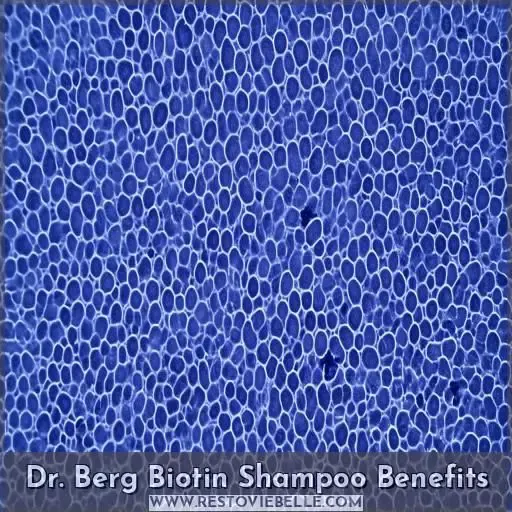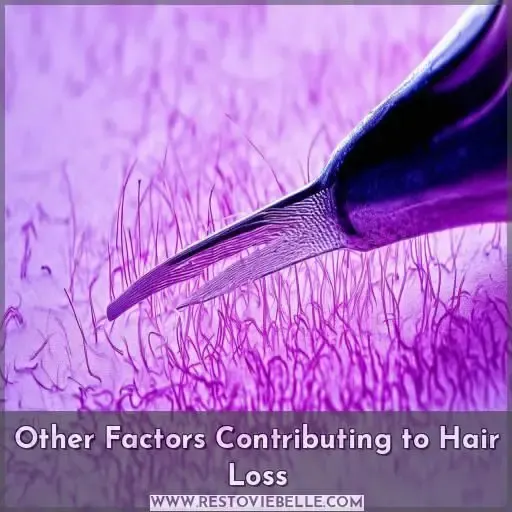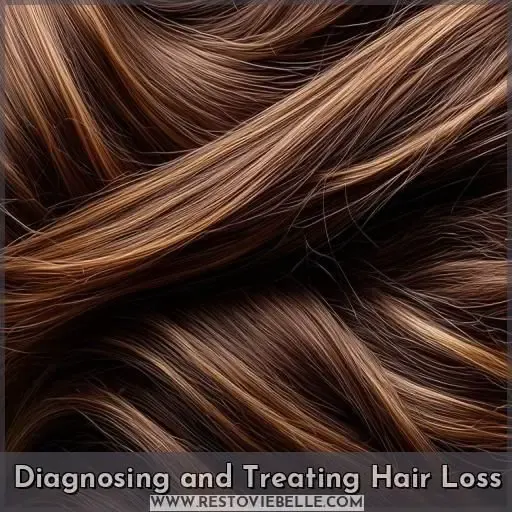This site is supported by our readers. We may earn a commission, at no cost to you, if you purchase through links.
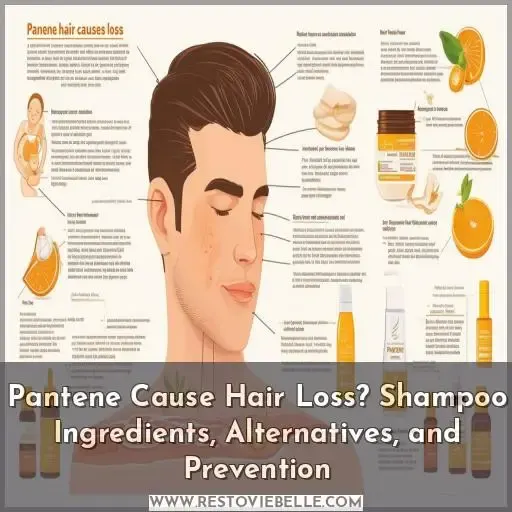 You’re right to be concerned – certain Pantene shampoo ingredients like sulfates and benzyl alcohol can potentially contribute to hair loss.
You’re right to be concerned – certain Pantene shampoo ingredients like sulfates and benzyl alcohol can potentially contribute to hair loss.
Sulfates strip your hair of natural oils, leading to dryness, breakage, and excessive shedding.
Benzyl alcohol may trigger allergic reactions and scalp irritation, clogging hair follicles.
While the jury’s still out on whether Pantene definitively causes hair loss, being an informed consumer protects your lovely locks.
But don’t worry, I’ve got alternatives lined up that could be a game-changer for preventing future thinning.
Table Of Contents
- Key Takeaways
- Does Pantene Cause Hair Loss?
- Pantene Pro-V Ingredients and Potential Hair Loss
- Potential Issues With Pantene Shampoo Ingredients
- Alternatives to Pantene for Hair Loss Prevention
- Choosing a Clean Shampoo
- Dr. Berg Biotin Shampoo Benefits
- Other Factors Contributing to Hair Loss
- Diagnosing and Treating Hair Loss
- Tips for Healthy Hair
- Frequently Asked Questions (FAQs)
- What shampoo does not cause hair loss?
- Which Pantene is good for hair loss?
- What is making my hair fall out?
- Is Pantene Pro-V good for your hair growth?
- How long after using Pantene did hair loss occur?
- Does Pantene provide refunds for hair loss complaints?
- Are there legal options for Pantene hair loss cases?
- What medical tests diagnose Pantene-related hair loss?
- How effective are hair growth supplements for regrowth?
- Conclusion
Key Takeaways
- Yikes, some ingredients in Pantene shampoo like sulfates and benzyl alcohol are ringing alarm bells for potential hair loss. Those harsh detergents can strip your strands bare and leave them high and dry.
- But don’t fret, there’s a silver lining! Switching to a gentle, sulfate-free shampoo loaded with nourishing goodies like biotin or natural oils could be a game-changer for reviving your tresses.
- If you’re shedding more than a cat in summer, it’s worth investigating whether tight hairstyles, chemical treatments, or even stress could be the culprit behind your hair’s disappearing act.
- When it comes to diagnosing hair loss, don’t go it alone. A dermatologist is your best bet to sleuth out the root cause and map out a proper plan of attack – whether it’s lifestyle tweaks, topical treatments, or just giving your locks some much-needed TLC.
Does Pantene Cause Hair Loss?
Yes, Pantene shampoo can potentially cause hair loss due to its ingredients like sulfates, parabens, and silicones that may strip the hair and scalp of natural oils and cause irritation. Some people experience excessive shedding or thinning after using Pantene shampoos.
Pantene Pro-V Ingredients and Potential Hair Loss
Pantene Pro-V shampoo contains ingredients like sodium lauryl sulfate (SLS), sodium laureth sulfate (SLES), and cocamidopropyl betaine.
These are surfactants that can strip your hair of its natural oils and potentially lead to dryness, breakage, and hair loss.
Benzyl alcohol, a preservative found in Pantene, may also trigger allergic reactions in some individuals.
This can exacerbate scalp irritation and contribute to hair thinning.
Sodium Lauryl Sulfate and Sodium Laureth Sulfate
You’re right to worry about sodium lauryl sulfate and sodium laureth sulfate in Pantene. These harsh sulfates strip your hair of natural oils, causing damage and potential hair loss. They can also irritate your scalp. Over time, sulfates leave hair dry, brittle, and prone to breakage – the last thing you want!
Cocamidopropyl Betaine
You should also watch out for cocamidopropyl betaine in Pantene shampoo. While a mild surfactant, it can still cause scalp irritation and dandruff in some people, potentially impacting hair growth. For excellent scalp health and to minimize hair loss, consider switching to a gentle, biotin-infused shampoo free of harsh ingredients.
Sodium Benzoate
Sodium benzoate is another concerning ingredient you’ll find in Pantene Pro-V shampoo. As a preservative, it can irritate sensitive skin and scalps, potentially leading to dryness, itching, and even hair loss over time.
Those with color-treated hair may be especially prone to adverse reactions from sodium benzoate‘s drying effects.
When choosing haircare products, prioritize ingredients gentle on your scalp and strands.
Benzyl Alcohol
Benzyl alcohol, a preservative in Pantene shampoo, may cause allergic reactions and contact dermatitis upon exposure. This harmful chemical can lead to scalp irritation, hair breakage, and clogged hair follicles. Avoid products containing benzyl alcohol if you have sensitivities to prevent adverse reactions and potential hair loss.
Dimethicone
You should also watch out for dimethicone in Pantene shampoo. This silicone-based ingredient can clog hair follicles, leading to buildup and potential hair loss. While it may temporarily smooth hair, the risks outweigh the benefits. Consider sulfate-free, paraben-free, and phthalate-free shampoos without dimethicone to keep your scalp and strands healthy.
Potential Issues With Pantene Shampoo Ingredients
While Pantene shampoos claim to nourish hair, some of their ingredients raise concerns. Sulfates can strip natural oils, benzyl alcohol may trigger allergies, parabens are linked to hormonal issues, and phthalates are associated with reproductive harm.
Sulfates Strip Natural Oils and Damage Hair
You should avoid sulfates like sodium lauryl sulfate and sodium laureth sulfate in Pantene shampoos. These harsh detergents strip your hair of its natural oils, leaving it dry, brittle, and prone to breakage. Over time, this can lead to excessive shedding and thinning hair. Switch to a gentle, sulfate-free formula to keep your locks healthy and strong.
Benzyl Alcohol May Cause Allergic Reactions
Benzyl alcohol, another Pantene ingredient, can trigger allergic reactions. You may experience:
- Scalp irritation and redness
- Itching or burning sensation
- Flaking or peeling skin
For those with sensitive skin, this chemical preservative could exacerbate existing conditions like eczema or dermatitis, potentially leading to further hair loss.
Parabens Linked to Hormonal Imbalances and Cancer
Pantene shampoos often contain parabens, which can disrupt hormones and potentially increase cancer risk. Studies show parabens mimic estrogen, causing hormonal imbalances that may inhibit hair growth. This occurs by impairing nutrient absorption, like biotin deficiency, starving hair follicles of essential nutrients for healthy hair growth. Eliminating parabens from hair products reduces cancer risk while promoting healthier hair.
Phthalates Linked to Birth Defects and Infertility
You should be wary of phthalates in shampoos like Pantene. These chemicals are linked to birth defects and infertility. Benzyl alcohol is another concerning ingredient that can cause allergic reactions. Opt for a natural shampoo free of harsh chemicals like phthalates. Look for products with rosemary oil to nourish your scalp and hair.
Alternatives to Pantene for Hair Loss Prevention
For oily hair, choose a clarifying shampoo with argan oil to remove excess oil while providing nourishment. Those with dry hair should opt for a hydrating shampoo formulated with natural oils like coconut or argan to restore moisture without weighing hair down.
Clarifying Shampoo With Argan Oil for Oily Hair
If you have oily hair, try a clarifying shampoo with argan oil. It will:
- Gently remove excess oil and buildup
- Nourish hair with vitamin E and antioxidants
- Leave your locks revitalized, not stripped
Argan oil is rich in fatty acids that moisturize without weighing hair down. Look for shampoos with invigorating tea tree or other essential oils too.
Hydrating Shampoo With Natural Oils for Dry Hair
If your hair feels dry and damaged, ditch the harsh shampoos.
Instead, go for a hydrating shampoo with natural oils like argan, coconut, or olive.
These haircare heroes nourish strands and restore luster.
Aloe vera can also work wonders for brittle hair prone to breakage from heat styling or traction alopecia.
Healthy hair starts with the right products suited to your needs.
Biotin Shampoo for Hair Health
Discussing hair health, you may want to contemplate a biotin shampoo to:
- Promote hair growth and prevent further hair loss
- Nourish hair follicles from the roots up
- Strengthen hair strands, reducing breakage
- Cleanse and hydrate without harsh chemicals
- Improve manageability and overall hair health
After all, a healthy scalp is the foundation for luscious locks!
Choosing a Clean Shampoo
When choosing a clean shampoo to prevent hair loss, it’s essential to avoid harsh chemicals like sulfates, parabens, phthalates, silicones, and alcohols by reading product labels carefully and opting for brands with certifications like organic or GMP. Look for natural and organic ingredients that nourish your hair and scalp without causing irritation or damage.
Avoid Sulfates, Parabens, Phthalates, Silicone, and Alcohol
When selecting a clean shampoo, steer clear of sulfates that strip hair, parabens linked to hormonal issues, phthalates associated with birth defects, silicone that clogs follicles, and drying alcohols. These ingredients can contribute to hair loss and damage. Opt for sulfate-free, paraben-free formulas free from harsh chemicals for healthier locks.
Look for Natural and Organic Ingredients
You’ll want to seek out organic options and herbal alternatives when choosing a clean shampoo. Look for natural ingredients like botanical extracts, essential oils, and plant-based surfactants. Many DIY shampoo recipes use simple items like baking soda, apple cider vinegar, and aloe vera gel – gentle yet effective cleansers.
Read Product Labels Carefully
You’ll also want to make a habit of carefully reading product labels. Look beyond the marketing claims and scrutinize the ingredient list for any potential irritants or questionable additives. Pay attention to the order of ingredients as well – higher concentrations are listed first. Taking this proactive approach helps guarantee product safety and transparency.
Choose Brands With Certifications (e.g., Organic, GMP)
Seek shampoo brands with certifications such as "organic" or "GMP" (Good Manufacturing Practices). These certifications demonstrate that the brand adheres to quality standards and has a reputation for producing safe and effective products. Certified organic brands avoid synthetic ingredients associated with hair loss, while GMP certification guarantees appropriate manufacturing processes for quality control.
Dr. Berg Biotin Shampoo Benefits
For those seeking an alternative shampoo that nourishes hair follicles and reduces hair loss, Dr. Berg’s Biotin Shampoo offers a solution. It contains highly concentrated biotin, botanicals, and essential oils that cleanse and strengthen hair without harsh chemicals.
Formulated for everyday use on all hair types, this shampoo aims to promote hair growth by hydrating and fortifying strands from root to tip.
Cleanses and Hydrates Without Harsh Chemicals
Unlike harsh commercial shampoos, Dr. Berg Biotin Shampoo gently cleanses and hydrates your hair without stripping it of natural oils. It’s made with:
- Biotin and botanicals to nourish your scalp
- Essential oils for added moisture
- No sulfates, parabens, or other irritants
Dr. Berg offers a hypoallergenic solution for anyone seeking a gentle, hydrating shampoo for healthy hair.
Strengthens Hair and Promotes Growth
You’ll experience strengthened hair and boosted growth with Dr. Berg’s Biotin Shampoo. Packed with hair-nourishing biotin, it fortifies strands from root to tip, enhancing elasticity and preventing breakage. This invigorating formula revives dormant follicles, encouraging fresh, healthy new growth for thicker, fuller locks.
Nourishes Hair Follicles and Reduces Hair Loss
You’ll love how Dr. Berg’s Biotin Shampoo nourishes hair follicles, reducing hair loss. With biotin for hair growth and strengthening, it promotes healthy strands from the roots up. It’s like a green juice for your scalp – packed with nutrients to revitalize and rejuvenate lackluster locks.
Contains Highly-concentrated Biotin, Botanicals, and Essential Oils
Dr. Berg’s biotin shampoo contains high levels of biotin, botanicals like rosemary and lavender, and essential oils that naturally nourish your hair follicles. These powerful, natural ingredients work to strengthen your hair and prevent further loss. By targeting the root cause with pure, gentle ingredients, your hair can finally thrive again.
Suitable for Everyday Use and All Hair Types
Dr. Berg’s biotin shampoo is ideal for everyday use, regardless of your hair type. Its gentle, botanical formula cleanses and nourishes without harsh chemicals, making it suitable for all hair textures and conditions. You can confidently use this biotin-infused shampoo daily to promote healthy hair growth and prevent breakage or thinning.
Other Factors Contributing to Hair Loss
While ingredients in Pantene shampoo may contribute to hair loss for some individuals, other major factors include tight hairstyles that pull on hair roots, chemical treatments that damage the hair shaft, and excessive brushing or heat styling that causes breakage. Stress, nutritional deficiencies, and underlying medical conditions can also trigger excessive shedding or thinning of hair.
Tight Hairstyles (traction Alopecia)
Tight hairstyles like braids, buns, and ponytails can lead to traction alopecia – hair loss from excessive pulling. Over time, this constant tension damages hair follicles, causing breakage, thinning, and even permanent hair loss. To prevent this, loosen hairstyles regularly, avoid sleeping with tight styles, and allow your hair to grow freely for best health.
Chemical Hair Treatments
You’re also at risk if you frequently use harsh chemical hair treatments like dyes, bleaches, relaxers, or perms. These can cause chemical burns, scalp irritation, allergic reactions, hair breakage, and thinning over time by damaging your hair follicles. Minimize these treatments, and always do a strand test first.
Excessive Brushing
In addition to harsh chemicals, excessive brushing can greatly contribute to hair loss and weakness. Vigorous brushing can damage hair cuticles, leading to breakage and thinning over time. Be gentle when brushing, especially on wet hair. Use a wide-tooth comb and consider swapping your brush for gentler, more hair-friendly options to avoid unnecessary trauma.
Emotional/physiological Stress (telogen Effluvium)
Like excessive brushing, emotional and physiological stress can trigger telogen effluvium – temporary hair thinning and increased shedding. You may notice:
- More hair strands on your pillow, in the shower drain, or on your brush
- Thinning hair, especially at the temples or crown
- Clumps of hair falling out, sometimes in handfuls
Stress taxes your body and disrupts the hair growth cycle, causing more hairs to prematurely enter the resting (telogen) phase.
Repeated Hair Trauma (acquired Trichorrhexis Nodosa)
You could also experience acquired trichorrhexis nodosa from repeated hair trauma like excessive brushing or harsh chemical treatments. To avoid this condition where fragile spots develop along the hair shaft, leading to breakage, be gentle with your hair care practices and limit brushing when hair is wet or dry.
Diagnosing and Treating Hair Loss
For individuals experiencing hair loss, it’s vital to determine whether the condition is scarring or non-scarring alopecia. While scarring alopecia involves permanent damage to the hair follicles, non-scarring alopecia can be reversible with proper treatment; hence, consulting a dermatologist is essential for an accurate diagnosis and appropriate management.
Scarring Alopecia: Hair Follicles Damaged Beyond Repair
Scarring alopecia causes permanent, irreversible hair loss due to hair follicle damage. You’ll need to see a dermatologist for treatments targeting scalp health and preventing further loss. While topical solutions may slow progression, you can’t regrow hair in scarred areas—the follicles are destroyed beyond repair. Maintaining scalp health is paramount to avoid worsening hair loss.
Non-scarring Alopecia: Reversible Hair Loss, Depending on Cause
Non-scarring alopecia means your hair loss is reversible, depending on the cause. Here are 3 key factors:
- Identify the trigger (stress, medication, hormones)
- Make lifestyle changes to address the root cause
- Give your hair time to regrow and recover
With non-scarring alopecia, you have options for regaining your hair’s health and fullness. Stay positive – reversible hair loss requires patience but offers hope.
Dermatologist Consultation for Diagnosis and Treatment
For reversible hair loss, it’s essential to consult a dermatologist for an accurate diagnosis and treatment plan. They’ll examine your scalp, review your medical history, and potentially order blood tests or a biopsy. Based on their findings, they may recommend:
| Topical Treatments | Oral Medications | Lifestyle Changes |
|---|---|---|
| Minoxidil Solution | Finasteride | Reduce Stress |
| Ketoconazole Shampoo | Iron Supplements | Balanced Diet |
| Biotin Supplements | Hormone Therapy | Gentle Hairstyling |
Their expert guidance is invaluable in preventing further hair loss and promoting regrowth.
Tips for Healthy Hair
To maintain healthy hair, wash your hair at a frequency appropriate for your scalp’s oil production – neither too often nor too infrequently. When washing, focus on cleansing the scalp thoroughly, but avoid over-scrubbing the lengths of your hair, which can lead to damage and breakage.
Wash Frequency Based on Scalp Oil Production
Determining the appropriate wash frequency is essential for healthy hair. Here are 4 tips:
- Monitor your scalp’s oil production – oily scalps need more frequent washing.
- Consider your hair type – fine hair gets greasy faster than coarse hair.
- Read product labels for "hydrating" or "volumizing" to match your needs.
- Use dry shampoo between washes to absorb excess oil and extend time between shampooing.
Washing too often strips your hair’s natural oils, so find the right balance.
Focus on Scalp Cleaning, Avoid Over-washing Hair Lengths
When washing your hair, concentrate on cleansing the scalp while avoiding excessive scrubbing of the lengths. This prevents scalp buildup and irritation while minimizing hair breakage. Massaging the scalp gently with your fingertips can help dislodge dirt, dandruff, and product residue, promoting a healthy, soothed scalp environment.
Choose Type-specific Products for Color-treated Hair
You’ve got color-treated hair, so you’ll want to choose a safe shampoo that won’t:
- Strip color
- Increase porosity
- Exacerbate scalp sensitivity
Look for sulfate-free formulas with nourishing oils like argan or coconut. Avoid anything with ammonia or bleach. In terms of colored locks, using the right products makes all the difference for preventing damage.
Protect Hair From Damage (minimize Coloring, Blow-drying, and Curling)
You’ll also want to protect your hair from excessive damage caused by heat styling and chemical treatments. Use a heat protectant before blow-drying or curling, and consider hair serums, deep conditioning, leave-in treatments, and hair masks to help nourish and strengthen your strands.
Minimize Traction Damage (avoid Tight Hairstyles and Excessive Brushing)
You’ll also want to avoid tight hairstyles like buns or braids, as these can lead to traction alopecia – hair loss caused by excessive pulling or tension on the hair follicles. And go easy on brushing; excessive brushing can damage and break hair strands, leading to thinner, weaker locks. Minimize these traction-related stressors for a healthier, fuller mane.
Frequently Asked Questions (FAQs)
What shampoo does not cause hair loss?
Did you know that 8 in 10 women experience hair loss? For luscious locks, nourish your tresses with a biotin-infused, sulfate-free shampoo free of harsh chemicals.
Which Pantene is good for hair loss?
You’re better off avoiding Pantene if you’re experiencing hair loss. Their products often contain harsh sulfates and silicones that can clog follicles and lead to shedding. Instead, opt for a gentle, sulfate-free biotin shampoo to nourish and strengthen thinning hair.
What is making my hair fall out?
Let’s unravel this hair-raising mystery, shall we? Trichologists say numerous factors, from unhealthy diets to hormonal imbalances and stress, can trigger excessive shedding or thinning. But don’t fret – simple lifestyle tweaks often restore those luscious locks.
Is Pantene Pro-V good for your hair growth?
No, Pantene Pro-V isn’t ideal for hair growth. The sulfates and silicones can strip your hair, clog follicles, and potentially contribute to thinning over time. Consider a sulfate-free, natural shampoo with hair-strengthening ingredients like biotin for healthier growth.
How long after using Pantene did hair loss occur?
Brace yourself, because the hair loss could start in as little as one bad hair day. Some unlucky folks noticed their locks abandoning ship after just a single use of Pantene shampoo. That’s a hairy situation no one wants!
Does Pantene provide refunds for hair loss complaints?
Unfortunately, Pantene typically doesn’t offer refunds for hair loss complaints. However, you can contact their customer service for potential resolutions if the issue persists after discontinuing use.
Are there legal options for Pantene hair loss cases?
A shocking 20% of shampoo users report hair loss. Don’t panic – you have options for legal action against Pantene if needed. Consult a lawyer to explore your rights and potential compensation for damages endured.
What medical tests diagnose Pantene-related hair loss?
To diagnose potential Pantene-related hair loss, you’ll need a scalp biopsy and blood tests. A dermatologist examines samples under a microscope, determining if ingredients caused inflammation or scarring.
How effective are hair growth supplements for regrowth?
Like shampoo ingredients, supplements lack proof for real regrowth. But like Goldilocks trying porridge, some with saw palmetto or pumpkin seed oil may get it "just right" to nourish thinning hair while tackling root causes.
Conclusion
Like caring for a delicate flower, maintaining healthy hair requires vigilance.
Pantene’s shampoo ingredients, like sulfates and benzyl alcohol, may contribute to hair loss – a concerning issue many face.
Fortunately, informed choices and switching to gentle, natural alternatives can nourish your locks, preventing damage and shedding.
With proper care and the right products, you can cultivate a lush, vibrant mane that radiates vitality.

